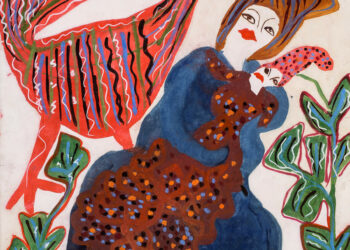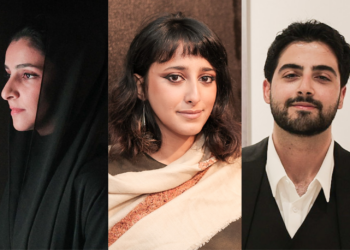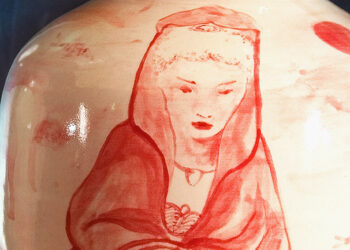Barbican Art Gallery presents ‘RE/SISTERS: A Lens on Gender and Ecology‘, a major group exhibition surveying the relationship between gender and ecology to identify the systemic links between the oppression of women and the degradation of the planet.

Fina Miralles, Relacions. Relació del cos amb elements naturals. El cos cobert de palla [Documentació de l’acció realitzada el gener de 1975 a Sabadell, Espanya] / Relationship: The Body’s Relationship with Natural Elements. The Body Covered with Straw, 1975, Courtesy of MACBA Museu d’Art Contemporani de Barcelona
‘RE/SISTERS‘ will bring together a global array of nearly 50 pioneering artists, including: Laura Aguilar (US); melanie bonajo (NL); Judy Chicago (US); Minerva Cuevas (Mexico); Agnes Denes (US); La Toya Ruby Frazier (US); Anne Duk Hee Jordan (Korea/Germany); Barbara Kruger (US); Ana Mendieta (Cuba); Otobong Nkanga (Nigeria); Ingrid Pollard (UK); Xaviera Simmons (US); and Pamela Singh (India). At its core, the exhibition seeks to platform the urgent work of artists from the Global South and Indigenous communities, including: Poulomi Basu (India); Simryn Gill (Malaysia); Taloi Havini (Bougainville / Australia); Sim Chi Yin (Singapore); Gauri Gill (India), as well as lesser-known but vital work from artists such as Mónica de Miranda (Angola/Portugal); Josèfa Ntjam (France); Zina Saro-Wiwa (Nigeria); and Carolina Caycedo (Colombia).
Shanay Jhaveri, Head of Visual Arts, Barbican, said: “In this era of deepening ecological crisis, we are proud to present RE/SISTERS: A Lens on Gender and Ecology, which interrogates the disproportionate detrimental effects of extractive capitalism on women and in particular Global Majority groups. This expansive exhibition, bringing together a truly international array of pioneering artists working with film and photography, will provide a powerful message of resistance in the face of crisis, and furthermore speaks to the Barbican’s ongoing work to foreground inclusivity and sustainability. We hope that in contrast to a rhetoric that is often cynical about environmentalism, it offers visitors a thoughtful, optimistic and sometimes joyful way to consider the world’s current climate.”
Organised thematically, ‘RE/SISTERS‘ is presented across six sections, addressing the politics of extraction; acts of protest and resistance; the labour of ecological care; environmental racism; and queerness and fluidity in the face of rigid social structures and hierarchies. Together, these groupings – encompassing a multidisciplinary range of film and photographic media – cast a new lens on critical issues at the forefront of our collective consciousness, re-framing our thinking around the environment and gender, and emphasising the radical power of care in the face of ecological destruction.
Ecological destruction and racism are two of the biggest challenges of the 21st century. They are also inextricably intertwined: there is a stark divide between who has caused, and continues to exacerbate, climate change, and who is suffering its increasingly catastrophic effects. ‘RE/SISTERS‘ explores this knotty matrix, asking how the commodification of common land and the exploitative extraction of natural resources speaks to environmental racism and a pervasive colonial-capitalist mindset, of which the physical act of extractivism (drilling, mining, pillaging resources) is a key symptom. Poignant works by Mabe Bethônico (Brazil)and Simryn Gill (Malaysia) expose the disproportionate and devastating impact of these unsustainable practices on local and Indigenous communities, whilst Dionne Lee’s (US) collage work interrogates the racialised histories of the American landscape and the profound structural inequalities surrounding land ownership and climate justice. Similarly, Zoe Leonard’s(US) powerful series Al Río / To the River (2016-2021) examines how the Rio Grande is weaponised in the starkly racist rhetoric around immigration in the US.
Mindful of the historic association of the feminine with nature as both a productive symbol as well as a problematic binary, ‘RE/SISTERS‘ will examine how women at once embrace and transcend traditional gender roles in advocating and caring for the planet. The exhibition explores politics of care amongst women and Indigenous communities, and how their alignment with nature has been exploited by colonial and capitalist forces which systemically degrade feminised and Indigenous bodies, and indeed the planet. Highlights include Agnes Denes’s (US) iconic work Wheatfield – A Confrontation (1982), for which she planted and harvested a wheatfield across a two-acre site close to Wall Street, New York, to reclaim the land and celebrate earth’s generative potential. This work is presented in dialogue with images and ephemera from Greenham Common Women’s Peace Camp, including never-before-seen colour images taken by women’s UK photography collective Format,who celebrate their 40th anniversary this year. Also exploring the intersection of care and activism will be the powerful film work by melanie bonajo (The Netherlands), Nocturnal Gardening (2016), which presents alternative and pre-colonial uses of land in an exploration of political and social agency in marginalised communities.
With a focus on empowerment rather than despair in the face of ecological breakdown, ‘RE/SISTERS‘ seeks to encourage a more reciprocal, grateful, and joyful relationship with our animate Earth, platforming works which reclaim nature as a feminist political space and which argue fiercely for the rights of Indigenous and Global Majority groups. Artists explore the use of camouflage and performance to construct dialogues between the body and its environment, as well as troubling the binaries of male/female and nature/culture. Ana Mendieta’s (Cuba) pioneering ‘earth-body’ works are critical to the exhibition, channelling Mendieta’s own belief in “one universal energy,” whilst Laura Aguilar’s (US) series Nature Self-Portrait looks to muddy the boundaries between body and earth. Taking the notion of transformation yet further, the exhibition explores liquidity and fluidity in a tender consideration of queer ecologies and hybridity. Anne Duk Hee Jordan’s (Korea/Germany) mesmeric film installation Ziggy and the Starfish (2018) presents hermaphroditic examples of aquatic life, drawing playful parallels with non-binary identity and questions of gender, whilst the Indigenous queer performance artist and activistUýra (Brazil) uses their drag persona to transform into a hybrid plant-human organism and advocate for greater environmental awareness in the Amazon basin.
Participating Artists:
Laura Aguilar (US); Hélène Aylon (US); Poulomi Basu (India); Mabe Bethônico (Brazil); JEB (Joan E Biren) (US); melanie bonajo (The Netherlands); Carolina Caycedo (Columbia); Judy Chicago (US); Tee Corinne (US); Minerva Cuevas (Mexico); Agnes Denes (US); FLAR (Feminist Land Art Retreat) (US); Format Photography (UK); LaToya Ruby Frazier (US); Gauri Gill (India); Simryn Gill (Malaysia); Fay Godwin (UK); Laura Grisi (Italy); Barbara Hammer (US); Taloi Havini (Bougainville / Australia); Nadia Huggins (St Vincents & Granada); Anne Duk Hee Jordan (Korea/Germany); Barbara Kruger (US); Dionne Lee (US); Zoe Leonard (US); Chloe Dewe Mathews (UK); Mary Mattingly (US); Ana Mendieta (Cuba); Fina Miralles (Spain); Mónica de Miranda (Angola/Portugal); Neo Naturists (Christine Binnie / Jennifer Binnie / Wilma Johnson) (UK); Otobong Nkanga (Nigeria); Josèfa Ntjam (France); Ada M. Patterson (Jamaica); PARI (People’s Archive of Rural India) (India); Ingrid Pollard (UK); Zina Saro-Wiwa (Nigeria); Susan Schuppli (Canada); Seneca Women’s Encampment for the Future of Peace and Justice (US); Fern Shaffer (US); Xaviera Simmons (US); Pamela Singh (India); Gurminder Sikand (India); Uýra (Brazil); Diana Thater (US); Mierle Laderman Ukeles (US); Kim Valdez (UK); Francesca Woodman (US); Sim Chi Yin (Singapore)
The exhibition is on view from the 5 of October, 2023, until the 14th of January, 2024. For more information, please visit Barbican.



